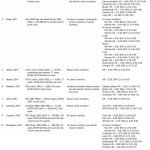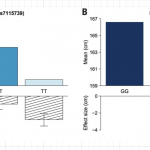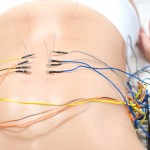diet
What, with all the attacks on science and scientist these days, we may not want to be focusing on those times when science goes off the rails and makes a huge mess of things. But, science at its best and scientists at their best, will never shy away from such things.
Dr. Paul Offit just wrote a book called Pandora's Lab: Seven Stories of Science Gone Wrong, which not about an evil black dog that escaped from a box, but rather, seven instances when the march of scientific progress headed off a cliff rather than in the desired direction. People died. Many people died. Other bad things…
Image from Pete Markham via Flickr Creative Commons (https://flic.kr/p/8ctqVC)
Researchers at the University of Cambridge in Britain recently studied 'willpower' in pet Labrador retrievers. After allowing each dog to smell a hot dog, the researchers placed the hot dog in a hamster cage and sealed it shut with duct tape. While some dogs showed only mild interest in the sealed-up hot dog, others were fixated on the out-of-reach treat. One dog, named Ash, broke apart the contraption to obtain the treat. This is interesting because although Ash is not obese or overweight, he…
I know this is not a comparative physiology topic, but this article caught my attention as I know I just ate a rather high fat meal last week for Thanksgiving and I plan to do the same throughout the holiday season.
Insulin does more than just lowering blood sugar by increasing its uptake into tissues. It can also increase blood flow to the hippocampal region of the brain to help cognitive function. This area of the brain is important in memory formation and spatial orientation. A new study published in the American Journal of Physiology - Endocrinology and Metabolism used…
One of the most effective spin techniques used by advocates of “integrative medicine” (also sometimes called “complementary and alternative medicine,” or CAM for short) to legitimize quackery has been to claim basically all non-pharmacologic, non-surgical interventions as “integrative,” “complementary,” or “alternative.” Thus, science-based interventions such as diet changes to treat and/or prevent disease, exercise, and other lifestyle alterations are portrayed as somehow so special, so outside the mainstream, that they need their own specialty, “integrative medicine,” even though they are…
I’ve mentioned on quite a few occasions that there’s a quote attributed to philosopher Arthur Schopenhauer that is much beloved of cranks:
All truth passes through three stages. First, it is ridiculed. Second, it is violently opposed. Third, it is accepted as being self-evident.
I also like to point out that Schopenhauer probably never said this and just how silly the thought behind this quote is when you think about it. Unfortunately, as I was perusing Twitter yesterday, I couldn’t help but think of this quote, but not in the way quacks and cranks usually intend. Rather, I was thinking of…
A few days ago the UN agency in charge of keeping track of cancer risks listed meat and processed meats as to some degree or another likely to cause an increase in cancer risks. I wrote about that here. More recently. I was interviewed by Joshua Holland on the Politics and Reality Radio show about that story. Here is the interview for your listening pleasure:
There is a new paper in Science linking genetic variation in people living in Greenland with long term selection for managing a marine-oriented diet, affecting stature, weight, and probably, physiological processing of omega-3 polyunsaturated fatty acids (PUFAs).
The vast majority of the variation we seen in stature (height) among humans is not genetic. That is a fact hard to swallow by so many of us who were told in biology class that "height is a complex genetic trait with many genes affecting it." It also seems wrong because the classic examples of variation in stature, the Pygmies of…
Image of a red deer from Wikimedia Commons. Image by: Jörg Hempel
Dr. Walter Arnold (University of Vienna) and colleagues were interested in studying how Northern ungulates cope (physiologically) with limited food supplies during the winter months. Ungulates are known to reduce energy expenditure during the winter. A new study published Wednesday in the American Journal of Physiology-Regulatory, Integrative and Comparative Physiology describes how these animals adjust their nutritional intake. Dr. Arnold's team examined intestinal transport of…
It's been a rather...interesting...weekend.
Friday, I noted the death of Jess Ainscough, a.k.a. "The Wellness Warrior," a young Australian woman who was unfortunate enough to develop epithelioid sarcoma, a rare cancer, at the age of 22. I've been blogging about her because after her doctors tried isolated limb perfusion with chemotherapy in an attempt to avoid an amputation of her left arm at the shoulder, her tumor recurred, after which she chose not to undergo amputation and instead to embrace the quackery known as Gerson therapy, which she did for over two years. By the time she finished…
Image of electroacupuncture to the back from www.sandiegohealingarts.com
A new study published in AJP-Regulatory, Integrative and Comparative Physiology suggests that electroacupuncture to the abdominal region may prevent increases in blood sugar concentrations after a meal by affecting insulin sensitivity and circulating free fatty acid concentrations. Granted this is not comparative physiology research, I find it interesting that electrical stimulation can have such a large impact on metabolism, in mice at least.
Drs. Nicola Abate and Jiande Chen, lead investigators…
A recent article published in the American Journal of Physiology reviewed how the brain regulates feeding behaviors. Humans are not the only species to eat food in spurts we like to call meals. Research suggests that this behavior may actually aid survival as it reduces exposure time to the environment and makes responding to fluctuations in the availability of food a bit easier to deal with. Dr. Marise Parent and colleagues at Georgia State University wanted to find out how your body determines when to initiate eating as well as how long the interval between meals should be.…
I'm thinking it will be the food you eat that gets you. Here's why.
Humans eat a wide variety of foods; as a species, the diversity of species we eat is greater than any other animal by a very large margin, with the only quirky exception being the animals that we take along with us, the commensals such as rats and cockroaches. Most primates eat a high diversity of foods, but about two million years ago or a bit less, according to the “Cooking Hypothesis” (which a lot of people think is correct) we took an already diverse primate diet and added to it anything we might encounter in the…
Practitioners of "complementary and alternative medicine" (CAM) have a love-hate relationship with randomized clinical trials (RCTs). Actually, it's mostly hate, but they do crave the validation that only randomized clinical trials can provide within the paradigm of evidence-based medicine (EBM). Yes, I intentionally said EBM, rather than science-based medicine (SBM), because, as I've described so many times before, the two are not the same thing. EBM fetishizes clinical trials, a fixation that I sometimes call "methodolatry," defined by a blog bud of mine from long ago as the "profane…
Unlike Santa's reindeer living in the lap of luxury at the North Pole, wild reindeer that live in the barren tundra have to find their own food. Being too chilly for trees, the tundra is hospitable to only shrubs, grasses and lichen, which are abundant during the warmer seasons. However, during the winter when the grasses and shrubs are scarce reindeer survive off lichen, comprised mainly of quick-energy in the form of carbohydrates. In fact, they reportedly eat about 4-11 pounds of lichen each day.
Source:
Animal Planet
If you are a meat eater, you probably appreciate the texture and flavor of a nice piece of loin, or a properly cooked pork chop, or a chicken breast that is moist and flavorful. But what is it about hot dogs that you appreciate? The pasty enigmatic texture? The idea that the casing either is, or imitates, the intestines of a pig? The possibility that the 'meat' inside the thing includes a high proportion of anus tissue, other bits of skin that were unsuitable for use as leather (i.e., nostrils), nerve tissue, and other non-muscle parts of animals, often of unspecified species?
Let me put…
All human hunter-gatherer groups that have been studied incorporate meat in their diets. Studies have shown that the total dietary contribution of meat varies a great deal, and seems to increase with latitude so that foragers in subarctic and arctic regions eat a lot of meat while those living near the equator eat less. It is probably true that tropical and subtropical foragers obtain more of their calories from plants than from meat over any reasonable amount of time. The meat consists primarily of mammals for most groups, but fish, birds, reptiles, and invertebrates can reach high…
Usually I don't mention books unless I've read them, but I thought a lot of my readers would be interested in a volume I have only heard about: Defiant Daughters: 21 Women on Art, Activism, Animals, and the Sexual Politics of Meat.
Here is the description:
When The Sexual Politics of Meat: A Feminist-Vegetarian Critical Theory by Carol J. Adams was published more than twenty years ago, it caused an immediate stir among writers and thinkers, feminists and animal rights activists alike. Never before had the relationship between patriarchy and meat eating been drawn so clearly, the idea that…
There are many fallacies that undergird alternative medicine, which evolved into "complementary and alternative medicine" (CAM), and for which the preferred term among its advocates is now "integrative medicine," meant to imply the "best of both worlds." If I had to pick one fallacy that rules above all among proponents of CAM/IM, it would have to be either the naturalistic fallacy (i.e., that if it's natural—whatever that means—it must be better) or the fallacy of antiquity (i.e., that if it's really old, it must be better). Of course, the two fallacies are not unrelated. In the minds of CAM…
An outcome some of you might expect, but for reasons you probably dont expect--
Let me tell you the punchline first:
Effect of High-Dose vs Standard-Dose Multivitamin Supplementation at the Initiation of HAART on HIV Disease Progression and Mortality in Tanzania, A Randomized Controlled Trial
Scientists had a pool of patients (over 3000) with HIV infection, who were prescribed HAART. They divided that group into two-- One group got a multivitamin, and one group got a 'high-dose' multivitamin. Part way through the study, they had to shut it down, because the patients on the 'high-…
Long, long ago, seemingly in a galaxy far, far away, I first encountered quackery on the Internet. Because I am a cancer surgeon, naturally I gravitated towards cancer quackery at first. Believe it or not, it was quite some time after that before I started to take an interest in what has become a major focus of this blog, the antivaccine movement and the misinformation it spreads. Both are equally damaging in their own way. True, these were back in the deep, dark days when I used to cruise various Usenet newsgroups, ranging from alt.revisionism (Holocaust denial), sci.skeptic (of course!),…












